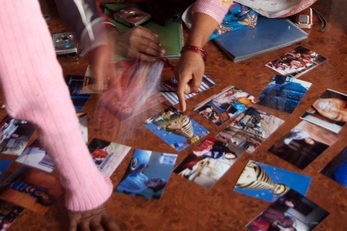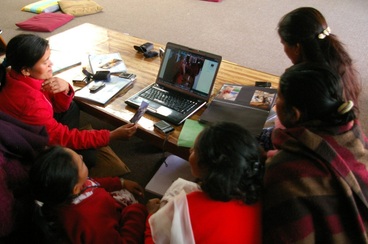
"I learned to use a camera... it has built confidence in me."
During winter 2010/11, British photographer and facilitator Sally Collister managed a three month participatory photography project in partnership with the Women’s Foundation of Nepal (WFN).
Six female participants, all residents at the WFN shelter in Kathmandu, attended workshops twice a week, where they learned basic digital camera skills.
The project aimed to offer the women - who have all experienced extreme domestic violence and poverty - a voice with which to tell their own stories in a safe and accessible way, increasing their self-confidence and learning new skills in photography and basic conversational English. It also offered an income-generating opportunity by producing a postcard to sell, raising much needed funds for WFN.
During winter 2010/11, British photographer and facilitator Sally Collister managed a three month participatory photography project in partnership with the Women’s Foundation of Nepal (WFN).
Six female participants, all residents at the WFN shelter in Kathmandu, attended workshops twice a week, where they learned basic digital camera skills.
The project aimed to offer the women - who have all experienced extreme domestic violence and poverty - a voice with which to tell their own stories in a safe and accessible way, increasing their self-confidence and learning new skills in photography and basic conversational English. It also offered an income-generating opportunity by producing a postcard to sell, raising much needed funds for WFN.

"Previously international volunteers
focused their programmes on the children, but this time there was a project
targeted at us women. We were all really happy to participate."
None of the participants had held a digital camera in their lives.
With a shoestring budget, the Mother Tongues project struggled financially but proved the possibilities for such grassroots projects. Basic digital cameras were purchased and since the final workshop have been donated to WFN (two remain at the shelter for the women's continued use, whilst the others will be used for documenting the work of WFN)
This participatory photography (or 'photovoice') project offered participants an opportunity to think creatively, learn new skills and experience the magic of image-making. The sense of fun was spread throughout the wider WFN shelter community who enjoyed having six budding photographers in their midst!
It offers a glimpse of the daily lives of these strong women as they have chosen to document it.
Please browse their image galleries and check out the beautiful postcard of their images of Nepal, which will be sold to generate an income for the WFN shelter.
None of the participants had held a digital camera in their lives.
With a shoestring budget, the Mother Tongues project struggled financially but proved the possibilities for such grassroots projects. Basic digital cameras were purchased and since the final workshop have been donated to WFN (two remain at the shelter for the women's continued use, whilst the others will be used for documenting the work of WFN)
This participatory photography (or 'photovoice') project offered participants an opportunity to think creatively, learn new skills and experience the magic of image-making. The sense of fun was spread throughout the wider WFN shelter community who enjoyed having six budding photographers in their midst!
It offers a glimpse of the daily lives of these strong women as they have chosen to document it.
Please browse their image galleries and check out the beautiful postcard of their images of Nepal, which will be sold to generate an income for the WFN shelter.

